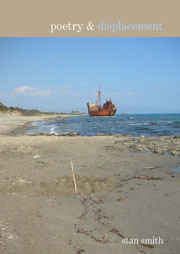Book contents
- Frontmatter
- Contents
- Acknowledgements
- 1 Introduction: Poetry, Place and Displacement
- 2 On the Edge of Things: Philip Larkin
- 3 A Double Man in a Double Place: Iain Crichton Smith
- 4 Salvaged from the Ruins: Ken Smith's Constellations
- 5 Lost Bearings: Christopher Middleton
- 6 ‘What Like Is It?’ Carol Ann Duffy's Différance
- 7 Darkening English: Post-imperial Contestations in Seamus Heaney and Derek Walcott
- 8 Living in History
- 9 An Age of Simulation: Tall Tales and Short Stories
- 10 Nowhere Anyone Would Like To Get To
- 11 Milking the Cow of the World: Displacement Displaced
- Notes
- Bibliography
- Index
2 - On the Edge of Things: Philip Larkin
- Frontmatter
- Contents
- Acknowledgements
- 1 Introduction: Poetry, Place and Displacement
- 2 On the Edge of Things: Philip Larkin
- 3 A Double Man in a Double Place: Iain Crichton Smith
- 4 Salvaged from the Ruins: Ken Smith's Constellations
- 5 Lost Bearings: Christopher Middleton
- 6 ‘What Like Is It?’ Carol Ann Duffy's Différance
- 7 Darkening English: Post-imperial Contestations in Seamus Heaney and Derek Walcott
- 8 Living in History
- 9 An Age of Simulation: Tall Tales and Short Stories
- 10 Nowhere Anyone Would Like To Get To
- 11 Milking the Cow of the World: Displacement Displaced
- Notes
- Bibliography
- Index
Summary
Letters of exile
In a Channel 4 television documentary broadcast in 2003 Philip Larkin observed of Hull, the city in which he had lived and worked for many years, ‘It is a bit on the edge of things. I rather like being on the edge of things.’ Not that living and working there implied some absolute attachment to place. On the contrary, being on the edge licensed a semidetached relationship with the place the poet happened to inhabit: he was always just passing through, just as, in his famous poem from The Less Deceived (1955) ‘I Remember, I Remember’, he dismissed Coventry, his birthplace, not as somewhere he had his ‘roots’, but ‘just where I started’. Larkin's attitude to where he happened to be at the moment is summed up more accurately in the image of desolation in his sonnet ‘Friday Night in the Royal Station Hotel’, from High Windows, with its possibly self-referential allusion (he may be writing the poem on that very paper) to ‘The headed paper, made for writing home / (If home existed) letters of exile’. The poem depicts the emptiness of the hotel's public rooms, hall, reception, dining and conference rooms, when all the salesmen staying there in the week have gone back to Leeds. The poem pointedly avoids saying ‘back home’, and Leeds is clearly just a metonymic elsewhere. Evoking ‘A larger loneliness of knives and glass’, the poem hints menacinglyat the possibility of murder at the heart of domesticity and dinner.
- Type
- Chapter
- Information
- Poetryand Displacement , pp. 20 - 40Publisher: Liverpool University PressPrint publication year: 2007



